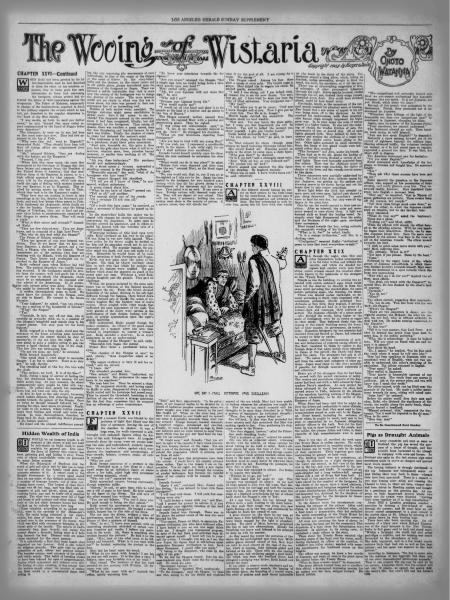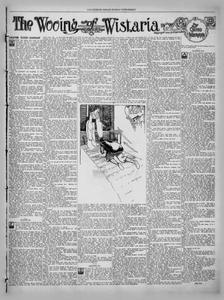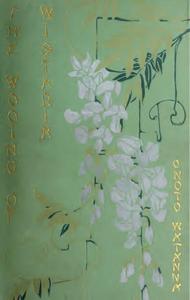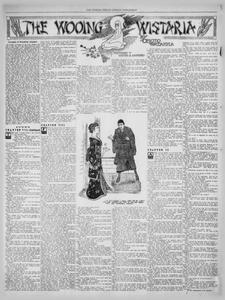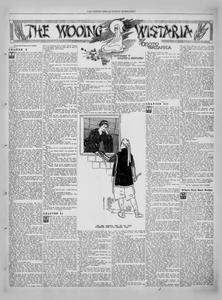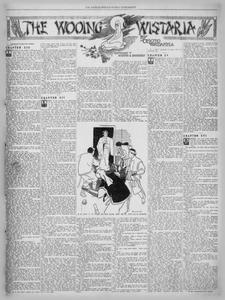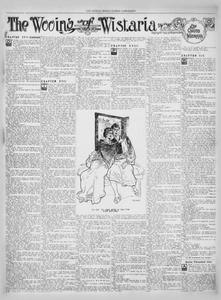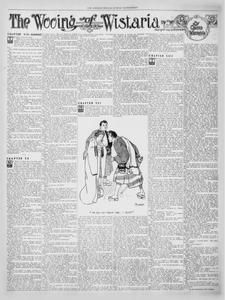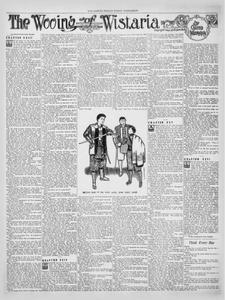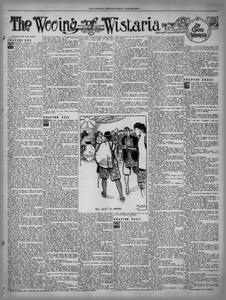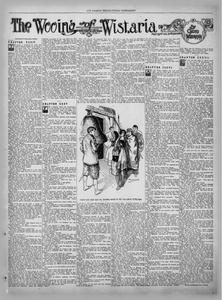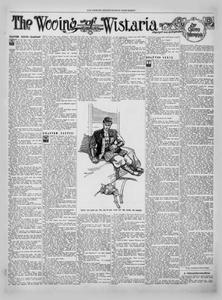Chapter XXVI – Continued
When Keiki had been greeted by his fellow Imperialists, and he had described to them the state of his southern resources, they in turn gave him such information as they had concerning the foreigners, whose arrival had obscured the future of their operations against the shogunate. The Prince of Echizen, temporarily in charge of the headquarters, reported in detail to his military superior the events which he had not yet described in his regular dispatches to the head of the Mori family.
“I was unable, my lord, to send you further news,” he said, “beyond the mere verbal report communicated by the Lord of Nagato before your departure.”
The foreigners, he went on to say, had been on the coast some days now. They had first appeared in the bay of Yedo.
“Why were they not sent to Nagasaki?” demanded Keiki. “They should have been told that all foreign affairs are administered from that port.”
“Ah,” returned Echizen, “they are dealing with the bakufu, not the Emperor.”
“Proceed, I beg you.”
“When first they came upon the coast they announced to the Governor of Niagara that they bore letters and presents from the President of the United States of America; that they must deliver them to the Emperor in person, or to a high official appointed for that purpose. They were told by the shogunate, which took upon itself the right of dealing with matters intended for our Emperor, to go to Nagasaki. They replied by moving nearer up the bay to Yedo, which they took to be the Emperor’s capital.”
“They have sent out parties in boats to take soundings in the bay, despite the Governor’s protests, and each hour brings them nearer to Yedo. This frightened the shogunate, which finally set a day for landing. To-morrow, near the fishing village of Yokohama, they are to land and present their letters to commissioners appointed by the Shogun to receive them. They will await a reply.”
“What is their nature and strength?” demanded Keiki.
“They are four ships-of-war. They are Americans, and in command of a high Lord Perry.”
“But why do they deal with the Shogun?”
The Prince of Echizen replied:
“They are ignorant of our true internal condition. They do not know that we have one true Emperor, a shadow of power, and a war lord, a Shogun, who rules for himself. These Americans are of the opinion that they are treating with the Mikado, with the Emperor of Japan. Their letters and credentials are inscribed to the Emperor of Japan.”
Keiki reflected upon what Echizen had told him. The national situation was rapidly becoming strained. If the foreigners should be driven from the country, well and good; but it was now no time to attack the shogunate, which must be as embarrassed as its opponent over the advent of the Americans. In all events, the only present policy was delay. The shogunate might be destroyed by the foreigners, yet—
A sudden determination came to Keiki. He must know the attitude of the Shogun, even at risk to himself. He turned to the future Premier.
“Your highness,” he asked, “can you procure for me a uniform of the household of Iyesada?”
“What! the Shogun?”
“Yes.”
“Certainly. In fact, one of our clan, who is secretly in sympathy with us, is a member of the Shogun’s household and stands close to his august person. You may pass for the Lord Sakura.”
Keiki, wrapped in a long cloak, stood near the entrance of the house awaiting some favorable moment, when the street should be clear of passers-by, to slip out into the night. As he was about to make a sudden spring to gain the street a hand clutched the hem of his cloak. The boy Jiro was restraining him.
“Go not out alone, my lord,” he entreated.
Keiki frowned impatiently.
“One would think I were about to encounter danger. I go but to observe. There is no danger,” he said, sharply.
The trembling hand hand of the boy Jiro tore wide the cloak.
“This uniform, my lord. It is of the Sho—”
Keiki, feeling a pang of sorrow at hurting the boy, but determined upon his mission, did not defer action long. At any moment, the street comparatively quiet, might be filled with wayfarers. He pushed Jiro gently but insistently from him and went out into the city.
At first he kept to the side streets, traversing much useless distance, but directing his general course towards the palace of the Shogun. Once or twice he thought himself followed, but, retracing his steps, came upon no pursuer. Finally he came to the avenues, where further concealment were fruitless and would only invite suspicion. In these thoroughfares, therefore, he flung back his cloak, permitting liberal glimpses of his bakufu uniform.
He found still the utmost indifference pervading the city concerning the movements of mere individuals, be they of the court of the Shogun or the court of thieves. In the story-tellers’ halls and the theatres, on the street corner and in all public places, groups speculated upon the presence of the foreigners in Japan. There was abroad a subtle, indefinable fear that in some way the coming of the foreigners was to change the destiny of the empire. The more ignorant could not see clearly in what way this was to come about, but there was present in their consciousness fear of an impending evil.
Nobles of both parties were unsettled. The foreign visitation might mean annihilation to either party. Ruin it did mean to one, but which? The shogunate seemed in the ascendant, since it had been recognized, blindly, but still recognized, by the foreigners. Thus among all classes there was manifest a great unrest, none the less threatening and fearful because its import was hidden. Plainly the shadow of events to come had darkened the nation’s mind.
The tradesman in his shop, showing his wares to a purchaser, stated their price uncertainly.
“Just now, honorable sir, the price is three yen, but the gods alone know what it will be tomorrow, whether more, less, priceless beyond measure, or smaller than nothing at all. The barbarians—”
“Ah yes, these barbarians.” His purchaser would nod understandingly.
At a street corner a woman approached a strolling samurai in the Shogun’s uniform.
“Honorable samurai,” she said, “what of the foreigners who have come?”
The samurai shrugged his shoulders.
“I’ll tell you all I know of them,” he murmured, without enthusiasm.
A group formed about him.
“What do you know of them?” pressed one.
“Tell us all,” said another.
The samurai shifted one of the swords.
“Of a certainty I’ll tell you all.”
“Yes?”
“Of a truth they have come,” he answered, as with a movement of disclaimer he passed up the street.
In the story-tellers’ halls the reciter was besieged with requests for stories and information concerning the Americans. In some cases he frankly avowed his ignorance, and in others regaled his hearers with the weirdest tales of a resourceful imagination.
Witnessing incidents of this kind upon every side, Keiki continued on his way to the palace. Of one thing he was now fully assured. Whatever policy for the future might be decided on by him and his associates could not be put into immediate effect. The popular impulse, the popular mind was dazed, and was not ready for action. Meanwhile he would learn all he could of the intentions of both foreigners and Shogun.
Keiki was now quite near the palace of the Shogun. His cloak he threw carelessly about him in such wise that while his uniform was exposed his features were muffled. The gate before which stood the samurai on guard at the outer post was open. Without a word Keiki strode haughtily past the guards. They gave no challenge.
Within the grounds inclosed by the stone walls there was no reflection of the disquiet manifest throughout the city. From the broad, elevated balconies of the palace, shining in the soft light diffused through the fusuma, there floated down to the strained ears of Keiki the sound of women’s laughter and the harsher tone of men’s voices. Music mingled with other sounds that indicated the quiet enjoyment of the night. The very guards at the doors were careless in the performance of their duties, looking with the eyes of artistic appreciation upon the night’s gentle festivities.
Still undisturbed, Keiki passed through the palace entrances. An officer of the guard stared curiously for a moment after him once, then turned in forgetfulness to answer a woman’s jest. Keiki ascended a stairway. In an upper ante-room he met an under-menial.
“The chamber of the Shogun,” he said, coldly.
“Honorable lord,” began the menial.
Prince Mori thrust a parchment before his eyes.
“The chamber of the Shogun at once,” he said, sternly; “these dispatches admit of no delay.”
“His august excellency is very ill and has retired,” said the servant.
“I know. Go!”
The attendant preceded him.
“One minute,” said Keiki; “understand, my mission is secret. But pronounce the name Sakura to his augustness.”
The man bent low. Then he entered a chamber. He reappeared shortly, and having signed to Keiki to enter, disappeared down a stairway. Keiki waited until his footsteps had passed away. Then he crossed the threshold, hesitating in the fashion of one who enters a strange apartment for the first time, conscious that its occupant has an advantage of prior acquaintance.
Chapter XXVII
For a moment Keiki was blinded by the profusion of light that blazed near the door of entrance, leaving the rest of the chamber in shadow. It was a large room, its walls tapestried in silk, wrought with embossed figures telling the history of the early Tokugawa wars. At irregular intervals about the room were set screens bearing the same gold-embroidered, symbolic figures. There were a few low tables, against which were thrown the implements and paraphernalia of war—swords, helmets, cuirass, armor, all richly wrought.
“Who are you?”
Keiki became conscious of a presence in the room. Stretched upon a low divan in a shadowed recess lay an indistinct figure, at whose elbow a low table, piled high with parchment and writing materials, stood.
“Who are you?” repeated the voice.
Keiki approached nearer, bowing courteously, though somewhat stiffly.
“Sakura,” he said, to gain time, while he held out a roll of paper in his hand. He drew nearer to the figure on the divan. The cold eyes of the other scanned him without fear.
“You are not Sakura. You are—I know you. Be good enough to bring me that cabinet.”
Keiki crossed the apartment to the spot indicated by the other’s gesture. He brought a small inlaid, lacquer box to the side of the divan.
The one upon the divan, without a trace of nervousness, opened the box and held up to the Prince of Mori a picture of himself.
“See,” he said, “I have your portrait, with an interesting description attached of certain cannon foundries and works I believe you maintain in the south. Ah, there is something else written beneath the picture.” He held it to the light. “Mori, head of the rebel cause, to be followed and beheaded. What is it you want with me?” he finished, replacing the portrait in the box.
Mori laid his hand upon his sword.
“What do you want with Iyesada? I am he, as you are well aware. It is less than a year, I believe, since your lordship was at my court.”
Mori winced. The memory of that last visit recalled his first meeting with Wistaria. He became very pale.
“What do you want with me?” inquired the other, quietly watching him.
“To know your intentions towards the foreigners.”
“Are you aware,” returned the Shogun, “that a single sign from me would bring down a thousand guards upon your head?”
Mori smiled coldly, grimly.
“Ah, but your highness will not make that sign,” he said.
“Why will I not?”
“Because your highness loves life.”
“You would murder me?”
“I would cut off your head and show it to the people as the head of a traitor and an enemy to the Son of Heaven.”
The Shogun appeared rather amused than alarmed. He regarded Mori with a peculiar and penetrating glance. Then he sighed. “I was young and venturesome once,” he said. “I, too, at one time, secretly believed as you do. Now—” He shrugged his shoulders.
“What are your intentions regarding these foreigners?”
“Are you here to treat with me, young Mori?”
“If you wish, yes. I represent a considerable party in the empire. I ask with right, for one day I shall unthrone your excellency.”
Iyesada turned himself quickly upon his elbow, while his eyes continued to scrutinize the other keenly.
“What would you do in my place?” he asked.
“Refuse their every demand and drive them into the sea,” returned Mori, as the blood tinged his cheek.
“No, you would not; that is, not if you are as far-sighted as I take you to be. Japan has been sealed to the foreigners for two hundred years, during which time she has grown strong in the development of her resources and her civilization. That period is at an end. It can never return. Foreign nations will demand trade with us. They will not depart at our refusal. They will use force, if necessary, holding that every nation must share in the comity of nations. If a nation refuse, they will divide her.”
“Pah!” said Mori, impatiently. “Is the policy, then, of our Imperial realm to be dictated by a hoard of barbarous peoples concerning whom we know naught, save what our history in the past has taught us? When in the years long past they were admitted to our lands and we opened our arms in hospitality towards them, what was our reward? Foreign disease, insolent demands, a fanatical religion, intolerant and exacting. Finally, we came to be treated as dogs by these our inferiors until we were forced to expel them, since which time has not our land been the happier for our seclusion?”
“It would seem,” said Iyesada, “that you are not, in spite of the reports I have heard concerning you, keeping abreast of the times. You are not a son of the dawning new Japan; you would retard the progression which is pressing upon us from all sides.”
“I would not have this progression come from the outside. I would not have my country advance from within. That is the reason I am an Imperialist. You are right, my lord; a new Japan is about to dawn, but not through the invasion of yonder barbarians, but because the rightful ruler of our country will be restored to his throne.”
Iyesada frowned.
“Again I ask,” continued Mori, flushed with his feeling, “do you intend to treat with these foreigners?”
“I will treat with them. I will yield, but combating every step.”
“I could declare a truce with you,” said Mori, “and I possess the power to enforce it, if you will assume your rightful function of war lord and expel the foreigners.”
Iyesada looked him through. There was in his glance the patient scorn of the man who sees beyond his life.
“You appear, Prince of Mori, to appreciate European civilization, you who have fashioned rifles. I have looked to you as one who might think with me. I thought you represented progress, in spite of the fact that your activities were directed against myself. I have left you to yourself for a time. I thought you saw, as I see, the new Japan, the Japan that in self-defense must assimilate European civilization to beat back these Europeans. I could offer you much.”
“I belong to the Emperor, who rules by the right of the gods.”
To his feat the Shogun leaped. Into his disease-deadened eyes there came the fire of strong will. He raised his arm.
“Sovereignty belongs to—”
“The Emperor,” finished Mori, passionately.
“To the strongest,” said the Shogun; “to that one who, seizing it, by his ability and wisdom uses it for the good of all. I am strong—he is weak. The strong—”
The Shogun ceased. Across his face there shot a spasm of acute pain. His breath came in gasps. Mori helped him to regain his couch. He smiled gently, sorrowfully.
“I said I was strong, yet I am indeed weak. I cannot live to see the new Japan. You may; but go, go! I have tried to save you from the folly of blind enthusiasm. You disappoint me—”
“My lord!”
“I will allow you to go in peace. Until now I have thought well of you. Now I give you up to your fate. Your life is in danger.”
Mori’s hands clutched his sword-hilt. The Shogun shook his hand weakly.
“Not now. You may leave the place safely, but I warn you that henceforth you will be hunted. You will be killed the moment you show yourself. I give you twelve hours!”
Keiki bowed profoundly, but coldly.
“As you please, my lord,” he said, in leave-taking.
As Mori retraced his steps through cross-streets he heard hesitating footsteps behind him.
His sword flashed out. Running around an angle in the street, he came upon a slight figure.
“Who goes there?” he shouted.
“It is I, my lord,” said a strangely sweet voice.
“Jiro! Well, my boy, so you followed me?”
“To protect you, my lord.”
Mori’s amused eyes scanned the slim figure of the stripling. He laughed tenderly.
“There was no need. I have twelve hours yet,” he said, reflectively.
Chapter XXVIII
As Jiro followed closely behind his master on their return to the little house by the water-front, he noticed signs of intense preoccupation and irritation in Mori. The boy attempted to walk beside him, gazing into his face with that wistful appeal of the eye which Mori had been unable to fathom whenever his attention was caught by it. Now he was too much occupied with his thoughts to be more disturbed by it. With a gesture of impatience he exclaimed, abruptly:
“Thou, Jiro, walk a space behind me.”
Jiro fell back. In this wise they proceeded for some minutes until Jiro perceived that Mori was making signals to him. Jiro, quickening his step, came nearer to the Prince.
“Jiro thou sluggard, hasten,” called the Prince.
Jiro made trembling haste.
“Call a norimono at once,” ordered his master.
Jiro ran into an adjacent street, returning shortly with the vehicle, at whose curtains he stood waiting for his lord to enter. Keiki’s absent glance fell upon the face of Jiro. It was tear-stained. The eyes wore that strange expression of appeal which always touched certain emotions in the heart of Mori, so that even in his harshest mood he could never be otherwise than gentle with the lad. Entering the palanquin, he drew Jiro in after him.
For a time they traveled in silence. Jiro broke it to inquire very timidly:
“Whither do we go, my lord?”
If Mori heard him he made no sign. The journey was continued in silence. At the end of what seemed to Jiro two full hours, Mori dismounted from the carriage and bade the runners wait for him. Jiro saw that they were upon the ridge of a headland overlooking the bay at whose head stood the Shogun’s city of Yedo.
At a sign from Keiki the boy followed the Prince down a path leading to the shore below. As they made their rough way long, Jiro saw lights flashing out in the bay, and occasionally he thought he heard the sound of oars.
A great distance up the shore he saw men at work upon a little building facing the bay. They were busily engaged by the light of abundant torches. The speed of Mori, however, permitted the boy to take few observations. Already his breathing was heavy and labored in his attempt to keep up with his master.
As they neared the water the curvature of the shore hid the torch-lighted spot from view. With sullen glance directed ahead of him, Mori kept on until he stood almost at the edge of the water, which in lapping, inky darkness glided and twisted at his feet. Then with his chin resting upon his arm, half reclining against a giant bowlder which, torn from the headland above, had ploughed a grudging way hither, Keiki looked out across the water.
It was silent—a silence made impressive and accentuated by elemental sounds, the lapping of the water below, the bursting of a crested wave, the swirl of pebbles and sand thrust insistently up the beach by the drive of the water. The darkness seemed a thing alive, which, taking on fiendish, malign personality, sought to blind the mind, the heart, the emotions, as it did the eyes.
There was an all-pervading suggestion of fate, of adversity, of other propagated influences through the night. Subtle spirits hovered, circled through the air, met, clashed their wings, turned, trembled down, down. Jiro could have shrieked aloud, could he have found voice.
Gradually, faintly, as the monotony of the natural sounds numbed his physical sense of hearing, Jiro found that a new sense of appeal to his ear was being made, off in the darkness. As they reached his consciousness, with their unmistakable human origin strongly impressed, his fright gave way. In its place came the calm of nerves raised to a higher tension. It was now the creaking of chains, the wooden friction of oars, the movements of men on board ship. All at once lights gleamed forth. They defined by their frequency and position the outlines of a vessel not unlike the smaller native boats plying in the bay. Other lights appeared in quick succession. Soon the forms of four giant vessels were indicated rather than revealed.
“The foreigner!” said Jiro, under his breath.
Then high up in the air, above the leading of the four defined vessels, flashed a variety of colored lights. These were instantly answered from the others. There was the rhythmic sound of men at work upon some machine, the clatter of chains at the bows, and the vessels moved nearer to the shore.
These maneuvers were partially understood by Keiki. The lord of that fleet, hitherto unseen by any Japanese, was getting up his anchors and drawing nearer to the shore, having sent out his boats first to take proper soundings.
Every light below the deck line revealed an open port, and every open, lighted port showed a gun slung shoreward. The squadron’s people were to land the next day, but they were all vigilance in the mean time.
One by one the vessels moved to their new position. After an interval, the noise and movement seemed to cease about them. A light was hoisted aloft on board the leading vessel. Instantly every light disappeared from the ports, and the blackness of the night again enveloped their movements.
Mori turned towards the boy, noting curiously the spasmodic working of his features.
“What is it, Jiro?” he asked, kindly.
“It is a strange civilization,” said Jiro, in a choking voice.
“Civilization!” repeated Keiki—“civilization! I seem to hear that word everywhere to-night.”
Chapter XXIX
All through the night, while Mori and other Imperialists looked interrogatively to the force within and without the country, and while the dreaded foreigners kept careful watch upon their ships, native artisans reared the structure afterwards known in the memories of the strangers as the “Treaty House.”
Simple as was the building, its erection was attended with certain outward signs which would have led the observer to identify in them the same spirit pervading the market-place, the open public gathering space, the theatres, the shops.
Those who labored under torch-light, an unusual proceeding in itself, were impressed with a misshapen, grotesque, wholly undefined fear. Artisans as they were, they realized, if sub-consciously, that their act had in it the germs of a future—dark and ominous, their instinces asserted. The Japanese officials—of a minor grade—who directed the work, being higher in the scale of intelligence, were by no means so vague in their minds. They believed firmly that the raising of this simple building meant the downfall of their country, its government, its institutions. Rapacious foreigners for two centuries had insulted them and flouted at Japan, had returned to accept no delay or parley.
Indeed, certain sub-rosa expressions of opinion and declarations of purpose among officers of the fleet, translated to them by visitors to the foreign ships of that alien nation alone tolerated in Japan at this period—the Dutch—had deepened the alarm. The strangers had said in effect: “No nation has a right to withdraw itself from the comity and commerce of other nations. Japan must come to this view; amicably if possible, but through cannoned arguments if not otherwise.”
Every act of the strangers thus far had been in accord with this secret expression of policy. The reserve and punctilious etiquette of the Japanese had been met with a bold advance by Commodore Perry’s squadron. At each pretext for delay advanced by the Japanese the ships had moved nearer to Yedo, believed by the officers of the squadron, knowing nothing of the Shogun-Emperor relationship, to be the capital of the Emperor of Japan.
When Perry had been told that he might deliver his letters and credentials to minor officials, he had replied that first they must send to him commissioners second in rank only to the Emperor. Perry himself, imitating the seclusion of those whom he sought to reach, took care to be seen or approached by no Japanese, delegating inferior officers to the task. Now for the first time he was to show himself to the people, and the nobles, the princes Aidzu and Catzu, in their capacity of high commissioners were to meet him.
Thus it was that all watched the work upon the Treaty House in sullen emotion. The workmen themselves moved in complete silence, which was broken not by word, but only by the noise of their operations. Their superiors gave their instructions by gesture or brief word.
The building itself was not pretentious, although its situation on a slight elevation near the water was central, in full view of the fleet out in the bay, and was overlooked by the surrounding heights and bluffs. It consisted of an ante-chamber and a long audience-hall, around whose side a sort of divan had been built. At the head of this apartment a number of chairs were placed for the comfort of the foreigners. In the centre of the space, upon a raised platform, whose tapestries and hangings suggested the altar of some semi-barbarian church, stood an immense red-lacquered box, destined for the reception of the papers brought by the foreigners for transmittal to the “Emperor.”
In the distance were the encampments containing the retinues of the princes Aidzu and Catzu, to which the artisans withdrew when, as a final touch of preparation, they had secluded the entire surrounding of the Treaty House by the erection of huge bamboo and silken screens.
All were now awaiting the hour of eleven in the morning, the hour set for the ceremonial. The departure of a boat from the Susquehanna was observed. In addition to its rowing crew, it contained a single officer in the stern.
Those about the Treaty House watched the dancing course of the boat over the waves, until, having discharged its officer at the coastline, it withdrew into stiller water; watched with seeming apprehension his landward course up the heights.
The officer was young; he knew a few words of Japanese, and went at once to the point upon his arrival before the Treaty House.
“What do these screens mean?” he demanded.
The minor officials looked from one to another. One official, a determined expression passing for an instant over his face, stepped forward. He bowed politely.
“We—insignificant and unworthy brained men that we are—cannot understand that honorable language that you speak. It is not Japanese, nor yet Dutch, which alone we know.”
Enough of this speech was understood by the lieutenant. Plainly, they pretended not to understand his Japanese.
“Wherefore these hidings of the light of the honorable sun from our insignificant eyes?” he continued in Japanese, changing his idiom.
Again, came the answer of the Japanese official.
“Your excellency, we cannot understand.”
The lieutenant uttered an oath. These heathen were trying, he told himself.
“Any one here speak English?” he demanded.
Instantly a figure sprang forward out of the crowd of sightseers beyond the military lines. Having advanced boldly, the volunteer hesitated an instant, as if he had acted upon an impulse, regretted a moment too late. It was Mori, but Mori still in disguise.
The American lieutenant saw his hesitation.
“Do you speak English?”
Keiki summoned such knowledge of the language as Satsuma had taught him. He answered briefly:
“Yes.”
“Then ask what these screens have been put up for.”
Keiki repeated the question to the Japanese officer, who, angered at his penetration of their evasion, cast scurly glances upon him. They answered readily, however. Mori translated their reply into English a moment later.
“They say,” he reported, “that in Nippon all great gatherings are private. These screens keep off the common, low people.”
“Tell them these things must come down,” ordered the officer, in what the Japanese considered an impolite, not to say insolent, tone.
Mori translated.
“What do they say?” asked the lieutenant.
There was a pause.
“Nothing yet,” said Mori, stiffly.
While the officials still stared, the officer turned to the offending screens. With his own hands he began their demolition. Slowly, one by one, the Japanese joined him. Soon the space once inclosed by the screens was bare to the view of all on the American vessels. The officer moved towards his boat.
“I wish to speak some more words with you,” said Mori, following him.
“Oh, certainly. What is it?”
“Not here, if you please. Down by the boat.”
“Come.”
Followed by the angry looks of the whole group of Japanese sub-officials, in which there was distinct hostility towards himself, Mori went with the lieutenant to a spot towards which the boat was approaching.
“Now what can I do for you?” inquired the officer, more affably.
“You think you treat with the Emperor?” inquire Mori, his face flushed by the other’s lack of courtesy.
“Certainly.”
“You do not.”
“What?”
The officer started, regarding Mori sceptically.
“No, you do not. You but treat with his war lord—the Shogun.”
“What’s the Shogun?”
“There are two emperors in Japan; one the rightful emperor, the Mikado; the other his vassal, his war lord, who is without authority to deal with you. He makes seeming submission to the Emperor.”
“Is this true?”
“Tell it to your master, that Lord Perry. Ask that he demand the truth from those sent to meet him, in the public gathering.”
“Why, this is astounding! It must be looked into. Will you come on board with me and report it in person?”
Mori shook his head.
“No, I cannot,” he replied, “but let him seek the truth where it must be told unto him.”
They had been speaking in Japanese, with an occasional word of English, when one was unable to understand the other’s rendering of its equivalent. The officer returned to English.
“Your name?” he asked.
Mori replied in Japanese.
“Your master is honorably ignorant of my name and rank. The truth from any source is sufficient. Ask at the proper place, and you will know that I speak the truth.”
The officer paused, with one leg lifted over the gunwale of the boat. He made a sudden movement towards his men, sitting with raised oars.
“Seize him!” he ordered.
Before the soldiers could drop their oars and obey, Keiki, who divined the significance of the words, ran rapidly along the sandy beach, disappearing beyond a headland.
“Blamed awkward, this,” commented the lieutenant, “but it must be reported to the old man.” Then to his crew:
“Give way, men!”
To Be Continued Next Sunday
